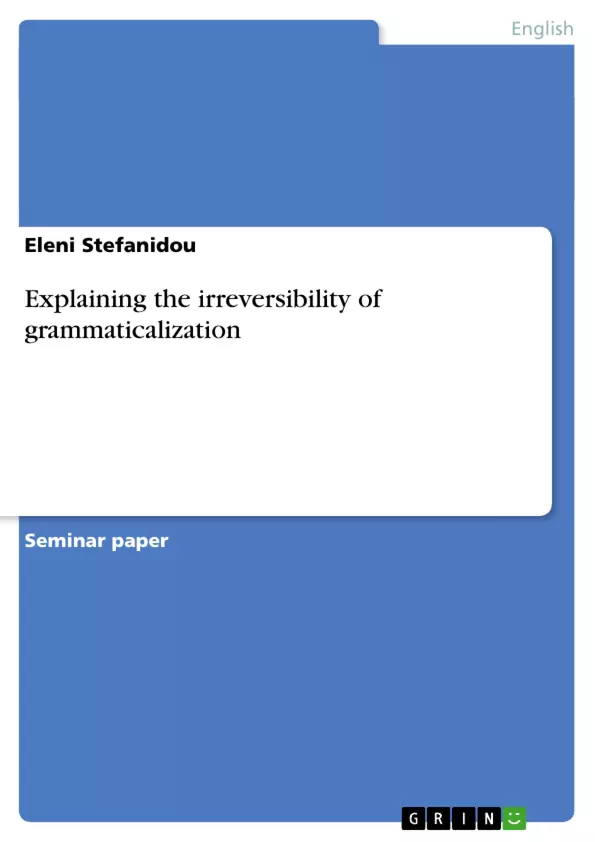The paper deals with the unidirectionality of grammaticalization, which is explained by Haspelmath within a usage-based theory of language change as proposed by Keller, who sees language change as an invisible-hand process. Haspelmath focuses on the maxim of extravagance as the main factor for irreversibility. The notion of extravagance was criticised by Geurts as being inappropriate and unnecessary for explaining the unidirectionality of grammaticalization. Haspelmath's explanation is extended by Huelva Unternbäumen, who derives the irreversibility of grammaticalization from three conditions that have to be fulfilled grammaticalization and degrammaticalization to take place.
Inhaltsverzeichnis (Table of Contents)
- Introduction
- The irreversibility of grammaticalization
- Grammaticalization as an invisible-hand process
- Ecological conditions
- Maxims of action
- Invisible-hand process
- Explaining irreversibility
- Grammaticalization as an inflationary process
- Grammaticalization as an invisible-hand process
- Criticism of Haspelmath's theory
- Extension of Haspelmath's theory
- Conclusion
Zielsetzung und Themenschwerpunkte (Objectives and Key Themes)
This paper aims to provide an account of Haspelmath's explanation for the irreversibility of grammaticalization within Keller's invisible-hand theory of language change. The paper will explore how the grammaticalization process is embedded within this theory, paying special attention to how the irreversibility of grammaticalization is derived from the maxim of extravagance.
- The irreversibility of grammaticalization
- Grammaticalization as an invisible-hand process
- Ecological conditions and maxims of action
- Criticism and extension of Haspelmath's theory
- The role of extravagance in explaining irreversibility
Zusammenfassung der Kapitel (Chapter Summaries)
The introduction defines grammaticalization as the unidirectional process by which lexical categories transform into functional ones. It introduces Haspelmath's explanation of grammaticalization within a usage-based theory of language change, emphasizing the role of Keller's invisible-hand theory. The paper also outlines the critical reception of Haspelmath's theory by Geurts and an extension of the theory proposed by Huelva Unternbäumen.
Chapter 2 delves into the irreversibility of grammaticalization, presenting the process as a unidirectional shift towards the functional end of a lexical-functional continuum. This chapter examines the concept of grammaticalization as an invisible-hand process, exploring the ecological conditions and maxims of action that influence this process.
Schlüsselwörter (Keywords)
This paper focuses on grammaticalization, its irreversibility, and the usage-based theory of language change proposed by Keller. Key concepts include the invisible-hand process, ecological conditions, maxims of action, and the maxim of extravagance. The paper also discusses the criticisms of Haspelmath's theory and an extension proposed by Huelva Unternbäumen.
Frequently Asked Questions
What is grammaticalization?
Grammaticalization is the unidirectional process by which lexical words (like nouns or verbs) transform over time into functional grammatical markers (like affixes or particles).
Why is this process considered irreversible?
Haspelmath explains irreversibility through the "maxim of extravagance," where speakers use new, vivid expressions to be noticed, leading to an inflationary process that only moves in one direction.
What is an "invisible-hand process" in linguistics?
It is a theory by Rudi Keller that describes language change as the unintended collective result of individual intentional actions by speakers.
What is the "maxim of extravagance"?
It is the speaker's desire to use unusual or "extravagant" language to attract attention, which eventually leads to the conventionalization and weakening of those expressions.
What are the criticisms of Haspelmath's theory?
Critics like Geurts argue that the notion of extravagance is inappropriate or unnecessary for explaining why language change doesn't typically reverse its direction.
- Quote paper
- Eleni Stefanidou (Author), 2007, Explaining the irreversibility of grammaticalization, Munich, GRIN Verlag, https://www.grin.com/document/83227



